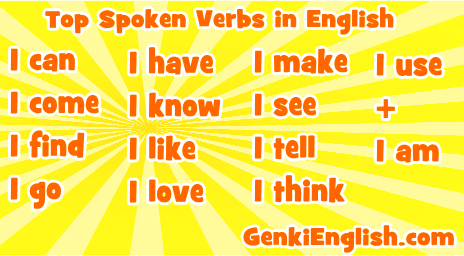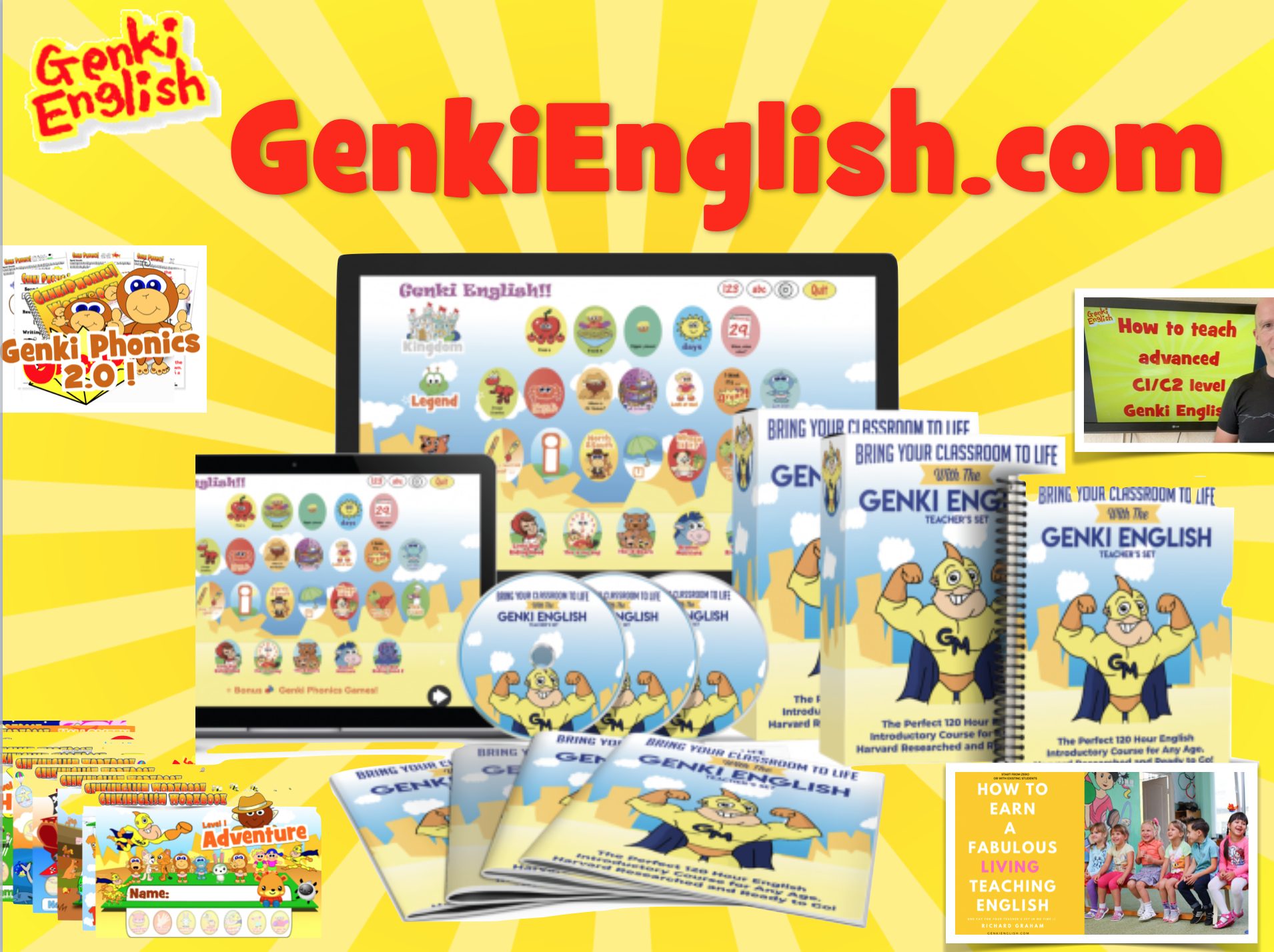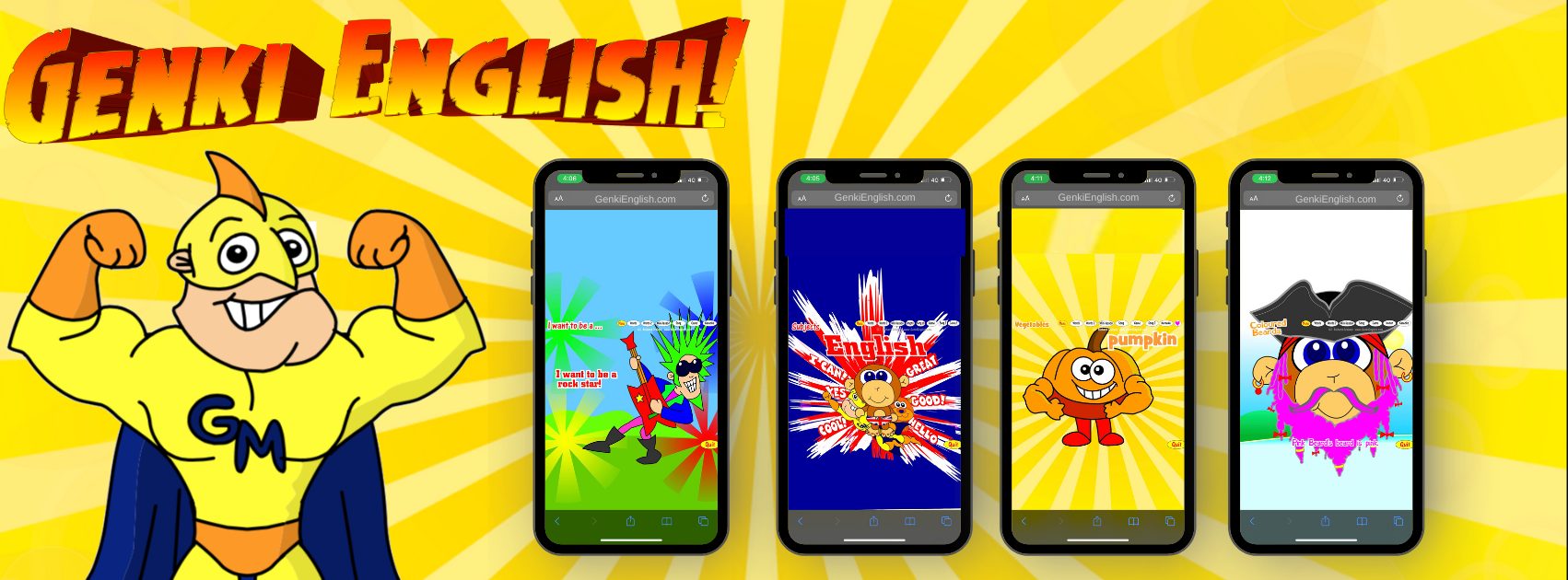We’ve talked before about the top 25 *words* in English – and how important it is to have them in your curriculum.
But what do you think the top 10 *verbs* are?
Things like “said” or “had” or “is”?
Well, maybe for written words, yes.
But as we all know the written language is very different from the spoken variety.
So here for you today ……..
The top *spoken* verbs in English (in alphabetical order) :

Ninja Tip: And notice how they are all “I” forms.
Some of these are, of course, a little tricky to teach.
So my question of the day is …..
How to do teach these verbs? Especially the more challenging ones e.g “come” or “tell” or “know”? Any magic tips or tricks?
I already have some things for can, come, have, like, make, see, think etc.
But …. I’d love to get *your* thoughts and share them with everyone here in the comments.
I’m sure it would make a fantastic resource for everyone so do get commenting away! 🙂
Be genki,
Richard
P.S. Last month’s comment competition winner was ….. Narno Díaz y Pérez. If you’d like to win a Genki English vol. download of your choice, just keep commenting on the blog. Each month I pick one comment out at random, and you could even win the Adventure Pack download (which isn’t even available to buy anymore!) The more you comment, the more chance you have to win! 🙂

P.P.S. One other quick question, if we had Ninja Baby Monkey acting out these verbs, how would you illustrate them, again especially the tricky ones like “come” or “tell” or “make”? I’d love to hear in the comments!




ohwow! I have the feeling there’s something in the bush!
Sounds very exciting.
“tell” (of course only a ninja friend) a secret (into the ear)
“make” a shurikenn (Of course we do this with Origami!)
“come” through the wall (these Ninja houses really ARE amazing!)
as for the verbs; I was wondering about “I go” and “I come”
I have the feeling these are different from the other ones, in that they are hardly used in their simple present form.
so “go” is usually combined with “I’ll” or I’m …ing to”
There are many songs already for most of these verbs and activities are easy to add; e.g. for “have” I ask them
How many bedrooms, toilets, toys, mosquitos, …do you have?
Starting simple and logical is the key to make them feel safe and understanding but then don’t wait too long before you get a bit out of the box, as it will tickle them.
I sometimes play it in a form of Karta, where they have to take the referring number, or they have to ask the question and other kids answer, etc. etc.
“love”comes natural to the kids with “like”, same way of teaching it.
okay,leave the space open for other’s idea.
This all sounds intriguing!
Building upon Margit’s idea of a secret…
I see a paper.
I find a letter.
I know a secret.
I tell my friend the secret….
I’ll leave it to you Richard to think of a great Ninja secret 😉
Hmm…I don’t know. Love to see your ideas on how to teach these common verbs!
Thank you Margit and Gumby for the ideas!
I’m somewhat “obsessed” with StPatrick’s these days 😉
– I see a rainbow
– I go to the end of the rainbow (a bit long this one!)
– I find a pot of gold
My students often have trouble when I ask them, say “Can you play tennis?” they’ll answer “Yes, I do” or ” Do you like ice cream? – “Yes, I’m”. They know well the phrases from the GE lesson, but as soon I change the vocab a bit, they’re often somewhat lost!I was thinking of drawing characters for these verbs (like a superhero for “can”) and using them as visual aids.
Please, don’t illustrate Baby Monkey as a soldier completely dressed in black weilding a sword.
@Dacha,
yeah~children on the one hand react right away from what they are used~so as long as they answer with “I do” to “Can you?” etc, I always see it as a time that they haven’t had enough speaking (it is not the logic or anything, I think)
AND which is more difficult they always react from their context and their experience.
So today I asked e.g.: those “Do you have …” questions, and they answered them all perfectly.
Do you have any pencils/pets/sofas/?
They would grab as many coins I had thrown upon the floor as they had pencils in their pencil case/pets at home, etc.
They were able to make the according sentence then by themselves:
I have 7 pencils. etc
But then I got to
“jump ropes”
and so far they know the sentence ”
“I can jump rope”
So they said in Japanese
“Oh, you want to know wether we CAN jump rope?”
or
“gorillas” and they hesitated right away saying
in Japanese “oh, do we LIKE gorillas?”
But, I think the fact that they hesitated and not shouted out “Yes I can” or “Yes I like gorillas” right away , shows that they got closer to the whole meaning and procedure.
Let us know if you use the character visuals. Sth. that might be worth trying, would be interested in how it goes.
for “tell” Use an animal and talk about what you tell them to do. Spin a song off this idea:
Example: Every day I tell my dog to sit,
and he sits.
Every day I tell my dog to run,
and he runs.
Every day I tell my dog to eat,
and he eats.
Every day I tell my dog not to bark,
but he barks.
Romaine definitely brings up a good point. Perhaps a shuriken (star like knives) would be more appropriate. It would also tie into Margit’s origami idea.
I’m guessing some of the verbs listed may be used in the past tense more often. I told, I found, would probably be more common than I tell, I find. Could you clarify this Richard?
Hi Trevor,
For the written lists, yes there are quite a few past tense formds. ( is, was, are, be, have, had, were, can, said, use, will, would, make, like, look, write, go, see, could, been, call, get, come, made, may)
But …. for the most popular spoken list above, it’s all present tense! 🙂
Kind of makes sense really! :
Hi Richard
I love your Ninja Baby Monkey. Dare I hope he’ll be starring in a Graphic Novel for beginners sometime soon? Have you seen the picture book Ninja! by Arree Chung? His ninja has more of a DIY look that might satisfy Romaine.
Looking at your list of top spoken verbs in English, I thought it was odd that they were all in the “I” form. This is Tim Ferris’s list, isn’t it? Do you know what corpus was used to generate it? I couldn’t find a reference on his blog. I searched for the top collocations of “find” in the spoken section of the Corpus of Contemporary American English and “I” doesn’t appear in the first 100. The top four are: ‘ll, can, will and could. I then decided to search the top ten spoken verbs in American and British English using the Corpus of Contemporary American English and the British National Corpus. Here are my results:
Searching only the spoken section of the British National Corpus for verb.base, the top 15 verbs are: know, think, mean, see, get, go, want, say, come, look, put, thank, like, need, take.
Searching only the spoken section of the British National Corpus for verb.ALL, the top 15 verbs are: ‘s, is, do, was, have, be, know, got, ‘ve, are, ‘re, think, can, get, did.
Searching only the spoken section of the Corpus of Contemporary American English for verb.ALL, the top 15 verbs are: is, ‘s, was, have, do, are, be, know, think, ‘re, going, has, would, were, had.
Searching only the spoken section of the Corpus of Contemporary American English for verb.base, the top 15 verbs are: know, think, want, mean, say, thank, get, go, look, let, see, need, come, believe, take.
I found the lists interesting and thought I’d share. Am I a geek or what?!
@Trevor
In the COCA, I told appears 1.7 x more often than I tell and I found appears 1.4 x more often than I find.
Great stuff there CJ!
Yeah, that list is the Tim Ferriss one, I believe it was in the Four Hour Chef book, so maybe there is a citation in there?
“I SEE something green. What is it?” (with flashcards, picture in a book, things in the classroom). Instead of ” I spy with my little eye…”
Come here – go there. Here is around the teacher, There is some marked place in the other end of the room. “John, come here”, “Stella, go there”. You can call the first child to come here and then he throws a coin “head” – he calls “Stella, come here”, tail – “Stella, go there”. You can do the same with rooms in the house. Put flashcards in a row on the board to mark the rooms, throw the dice and say ” John, go to the kitchen”. Then John stands next to the kitchen flashcard, throws the dice and says “Ann, go to the bedroom\bathroom\attic” or “come to the kitchen”. You can do it with tokens and a board-game house or with dolls and dolls’ house.
I think you should grow to eleven, my students say “DO” 100 times, and it replaces all the other verbs, besides works as the auxiliar for past and present simple tenses. However, your lesson is remarkable, as always.
whatever vocab topic we’ve been doing, e.g. school things, it comes quite naturally to ask after a few sessions when they are secure on the basic nouns to ask individuals:
“tell me what you have in your pencil case” or “tell me 3 school objects”
It doesn’t seem like explicit teaching, but much, much later they’re able to ask each other “tell me ” questions!